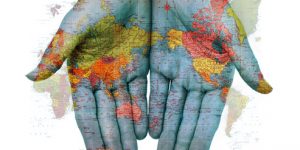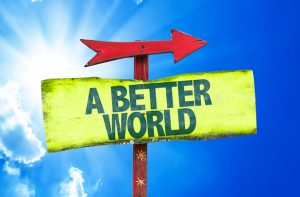 What if you could use the power of communications to drive change for a better world? Meet Kajsa Rosenblad, a Swedish-Dutch communications student at the University of Amsterdam. Over a cup of tea at my dining table, here’s what she shared about the better world she wants, the role of politics and her generation.
What if you could use the power of communications to drive change for a better world? Meet Kajsa Rosenblad, a Swedish-Dutch communications student at the University of Amsterdam. Over a cup of tea at my dining table, here’s what she shared about the better world she wants, the role of politics and her generation.
The interconnection of social and environmental issues
 “My desire to create a better world started at a very young age. Already in primary school, I was concerned about how boys and girls were treated differently. Inequality really bothered me, so I tried to speak up for those people who were not able to have a voice themselves. I felt it just wasn’t fair that some people make trouble and others suffer as a result. In secondary school, I discovered that environmental issues are similar in a way. Again, there were people causing trouble and others suffering, yet not necessarily in the same location. And oddly enough, the two issues are interconnected. The decision makers causing environmental issues are often men; the people who suffer from the results of those decisions are more likely to be women.
“My desire to create a better world started at a very young age. Already in primary school, I was concerned about how boys and girls were treated differently. Inequality really bothered me, so I tried to speak up for those people who were not able to have a voice themselves. I felt it just wasn’t fair that some people make trouble and others suffer as a result. In secondary school, I discovered that environmental issues are similar in a way. Again, there were people causing trouble and others suffering, yet not necessarily in the same location. And oddly enough, the two issues are interconnected. The decision makers causing environmental issues are often men; the people who suffer from the results of those decisions are more likely to be women.
Looking for ways to drive change, I became very interested in politics at a young age. I remember spending an entire afternoon browsing the website of Sweden’s Green Party at age 14. I was so inspired by the world they wanted to create. Just a year later, I joined their youth chapter. I actively campaigned for them until I moved to the Netherlands to study. But I will actively campaign for them in the spring, persuading Swedes living in the Netherlands to vote for them in the upcoming elections.
A better world for my generation – and perhaps our children
 I may be more active than others in my generation, but I know my friends are also concerned about the state of our world. We’re not sure of what the world will be like in the years to come. Some of my friends are even talking about not having children in the future, as they’re not sure this is the world where they want to raise kids. I also feel there is quite some cynicism among my generation, a feeling that we have to clean up everyone’s mess. A potential intergenerational mess. Yet at the same time, we’re part of the problem, too. The world is our oyster, we too are flying everywhere. As part of the Western world, our parents and we are all part of the problem.
I may be more active than others in my generation, but I know my friends are also concerned about the state of our world. We’re not sure of what the world will be like in the years to come. Some of my friends are even talking about not having children in the future, as they’re not sure this is the world where they want to raise kids. I also feel there is quite some cynicism among my generation, a feeling that we have to clean up everyone’s mess. A potential intergenerational mess. Yet at the same time, we’re part of the problem, too. The world is our oyster, we too are flying everywhere. As part of the Western world, our parents and we are all part of the problem.
The world I’d like to live in is in balance with nature. There are fast trains to travel around the world, our diet is fully vegetarian and the ecological way to life is cheaper than non-sustainable alternatives. Governments and companies take an interconnected approach to social and environmental challenges, helping people take the right choices. The educational system also has a role to play, integrating environmental and social awareness and action at every step of the school system.
The power of communications to drive positive change
 I try to contribute to this better world as much as I can. By voting with my fork, choosing organic food when possible. By talking to my friends and fellow students about these issues, and by writing about them in Medium Magazine on a regular basis. I am currently learning to code and digging into online communications. Wouldn’t it be great if social media could be used to drive positive social change, rather than to maintain social bubbles?
I try to contribute to this better world as much as I can. By voting with my fork, choosing organic food when possible. By talking to my friends and fellow students about these issues, and by writing about them in Medium Magazine on a regular basis. I am currently learning to code and digging into online communications. Wouldn’t it be great if social media could be used to drive positive social change, rather than to maintain social bubbles?
After I complete my studies, I want to apply my communications knowledge for that better world, too. As an investigative journalist to make people more aware of issues and solutions, or perhaps in a marketing agency, working for clients that also want to address issues, like Oatly and Tony’s Chocolonely. Or perhaps as an academic, deepening our understanding of how to nudge people to take the decisions for that better world. Understanding how to best balance fear and hope to inspire action. And then getting that knowledge out there to companies and politicians to drive change.”
For more information about Kajsa and what keeps her busy, check out her writing on Medium Magazine. Including this review of An Inconvenient Sequel, which vividly describes how Al Gore’s first movie inspired her to action. I am very proud to be Kajsa’s godmother and truly enjoy our many conversations about the better world we both want.
Interview by Marjolein Baghuis (@mbaghuis) for Change in Context. To read interviews with interesting people, book reviews and other posts about change, communications and sustainability, please subscribe in the right-hand column.
Photo Kajsa by Thomas Korver (@thomkopic).
